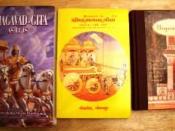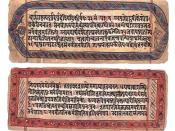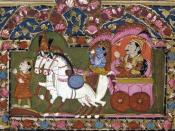Dharma is the moral law that Hindus follow throughout life. Through the teachings of Bhagavad Gita, one can find the right way of living and the correct attitude for every situation. In Hinduism, the sacred `song of God' was composed about 200 BC and incorporated into the Sanskrit epic, Mahabharata. It contains a discussion between Krishna and the Indian hero Arjuna on human nature and the purpose of life. This "song of God" is the Bhagavad-Gita Gita. According to the Gita, Dharma is the purpose of life.
Hindu Dharma, popularly called Hinduism, is the religion of over a billion Hindus, who mostly live in India, but have large populations in many other countries. Hindu Dharma is also known as Vaidika Dharma, meaning "religion of the Vedas," the ancient Hindu scriptures. The original name of Hindu Dharma is Sanãtana Dharma, or "universal religion." .
Unlike other religions, Hindu Dharma did not originate from a single person, a single book, or at a single point in time.
The foundations of this oldest surviving religion were laid by ancient rishis or sages, who taught their disciples the eternal principles of life they had discovered through their meditations The rishis did not claim authorship of these spiritual principles. Although some names are mentioned in scriptures, nobody knows exactly who these people were or when they lived. Thus, Hindu Dharma is essentially a religion of principles rather than persons.
"Hindu Dharma is analogous to a fruit tree, with its roots representing the Vedas and the Upanishads, the thick trunk symbolizing the spiritual experiences of numerous sages and saints, its branches representing various theological traditions, and the fruit itself, in different shapes and sizes, symbolizing various sects and sub sects."(Introduction)
According to Gita, the path of devotion is the easiest path...


